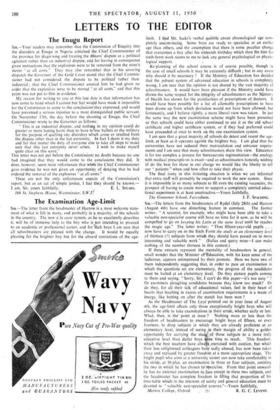S1R,—The letters from the headmasters of Rydal (July 28th) and
Harrow (August 4th) have one disturbing feature in common. The former writes: " A scientist, for example, who might have been able to take a valuable non-specialist course will have no time for it now, as he will be compelled to go on keeping his Latin at the same level until he reaches the magic age." The latter writes: "Thus fifteen-year-old pupils . . . now have to carry on in the Sixth Form the study at an elementary level of thirteen (?) subjects from which they should bave passed on to more interesting and valuable work." (Italics and query mine—I can make nothing of the number thirteen in this context.)
if these extracts represent the mentality of headmasters in general, small wonder that the Minister offtducation, with his keen sense of the ludicrous, appears unimpressed by their protests. Here we have two of them independently suggesting that, in order to pass an examination in which the questions set are elementary, the progress of the candidates must be halted at an elementary level. Do they picture pupils coming to them and saying, "Sorry, Sir, I can't do this paper—it's too easy " ? Or examiners ploughing candidates because they know too much? Or do they, for all their talk of educational values, feel in their heart of hearts that teaching in excess of examination requirements is a waste of energy, like batting on after the match has been won ?
As the Headmaster of The Leys"-pointed out in your issue of August 4th, the age-limit affects only those exceptionally bright boys who will always be able to take examinations in their stride, whether early or late. What, then, is the- point at issue ? Nothing more or less than the freedom of headmasters to encourage bright boys of fifteen, or even fourteen, to drop subjects in which they are already proficient at an d4tui elementary level, instead of seeing ' their margin of ability a golden opportunity for carrying the stu . of those subjects to a more truly educative level than duller boys ve time to reach. This freedom, which the best teachers have always exercised with caution, but which their less enlightened colleagues have sadly abused, has now been taken away and replaced by greater freedom at a more appropriate stage. The bright pupil who aims at a university career can now take comfortably-in his stride, at 16-plus, an examination in three or four subjects, omitting the two in which he has chosen tkospecialise. From that point onwards he has no external examination to.face except in these two subjects, and the headmaster has complete freedom in filling that proportion of his time-table which in the interests of sanity and general education must be devoted to "valuable non-specialist-tourses."—Yours faithfully,


































 Previous page
Previous page